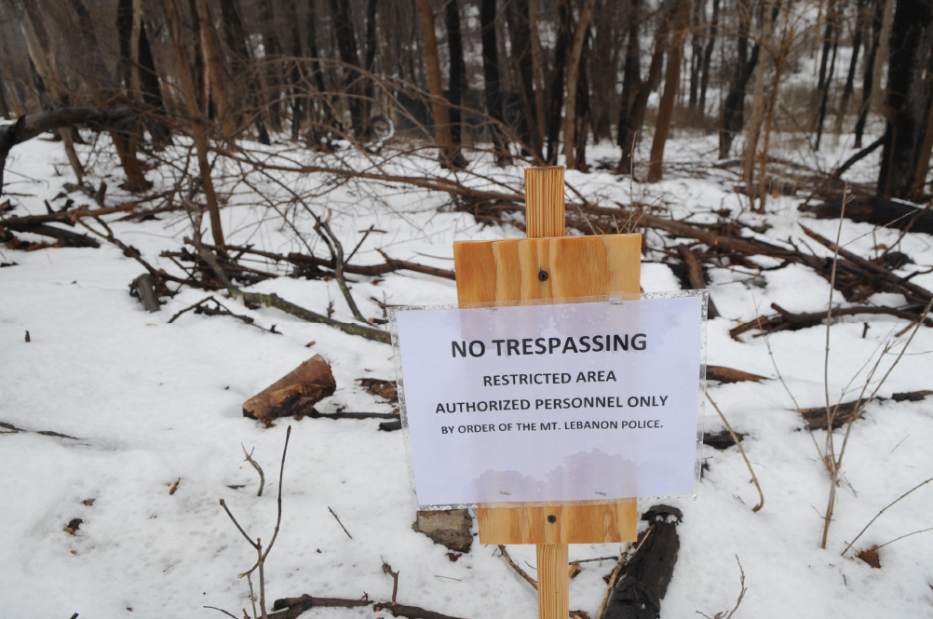Mt. Lebanon deer-culling corrals sprayed with urine, repellent
Mt. Lebanon police are investigating people caught on camera spraying deer culling corrals and bait with deer repellent and urine.
J. Merlin Benner, president of Tioga County-based Wildlife Specialists LLC, said the photos taken by his infrared game cameras show people at some of the automatic feeders and corrals taking pictures and spraying the area with either urine or deer and rabbit repellent to keep deer away from his corrals. Controversy about the plan to lure the deer into the corrals and shoot them in exchange for $500 a head has raged for weeks in the municipality.
So far no one has damaged the automated feeders or fences, but Benner said he worries protests and disruptions will get worse early next week, when, after dark on Monday, his contractors will start closing deer inside the corrals with remotely triggered gates and shooting them with rifles with sound suppressors.
“I don't trust them to abide by the law, because they haven't so far,” Benner said.
He couldn't provide a description of the people in the images.
Residents and others calling the culling inhumane and ineffective have staged peaceful protests and spoken out at the last two Mt. Lebanon Commission meetings and rallied Saturday near a corral on public conservation land off Connor Road. Other corrals or bait stations were set up in Bird, Robb Hollow and McNeilly parks, and on the municipal golf course.
Resident Jason Margolis, who has been part of the group organizing the protests, said he and others against the cull have made multiple statements that no one in the opposition should do anything that would get them arrested. He said he was unaware of anyone in the group trespassing at the sites.
“These are not anarchists,” he said of the protesters. “These are people with a conscience.”
Since late February, Mt. Lebanon has worked on the plan to capture and kill deer on municipal land with the goal of reducing vehicle collisions by 50 percent — from about 50 reported in 2014 — over five years. The contract with Wildlife Specialists will pay $500 per deer killed, for a maximum of 150 deer and $75,000 through March 31. The municipality's permit from the Pennsylvania Game Commission allows trapping, corraling and culling deer through the end of September.
Mt. Lebanon Deputy Chief of Police Aaron Lauth confirmed that police were investigating the photos, taken Feb. 21 and late last week, but no charges or citations were issued. On at least two occasions, the person in the photos was carrying something that could be used to apply liquid to the bait, Lauth said. If the people in the photos are identified, they could be charged with trespassing or criminal mischief, he said.
Police check on the corrals and bait stations as part of their regular patrols but no one is stationed at the corrals, Lauth said.
Benner said he hadn't tested what kind of urine was applied — whether human or predator, which would repel the deer, or other deer's urine, which would attract them.
When shooting begins, Benner's staff will call police shift supervisors to tell them where and when, so officers who receive calls for shots fired can know it might be the contractors. The contractors will notify police when they're finished for the night.
“If we get a call of shots fired from Bird Park and we know that's where they're working, we can put two and two together,” Lauth said.
Mt. Lebanon's state-issued permit to cull deer requires the meat go to charity through Hunters Sharing the Harvest, which connects hunters and processors to food banks and soup kitchens that can feed the venison to the needy.
Benner said people have been bombarding the companies that would likely process the dead deer with questions or claims about the safety of the meat, to the point that he refused to name the processors or food banks that would accept the meat for distribution through Hunters Sharing the Harvest.
“People have been calling them four times a day,” Benner said.
Margolis said his opposition group made calls but merely sought information about whether Mt. Lebanon was fulfilling the donation condition of the culling permit. Rudy Sukal, Mt. Lebanon's acting public works director, said finding processors and recipients for the donated venison was the contractor's responsibility.
“If someone feels they're being harassed, all they have to do is say so, and we'll stop,” Margolis said.
John Plowman, executive director of Hunters Sharing the Harvest, said he hadn't heard from Mt. Lebanon or Wildlife Specialists regarding donations, nor had Jesse Sharrard of the Greater Pittsburgh Community Food Bank.
Sharrard said the food bank would accept venison if it went through a processor certified by the state Department of Agriculture.
Kip Padgelek of Kip's Deer Processing in Carnegie, the only processor in Allegheny County with Pennsylvania Department of Agriculture certification, declined to comment.
“We would like that meat, and food banks could sure use it,” Plowman said.
Matthew Santoni is a staff writer for Trib Total Media.


